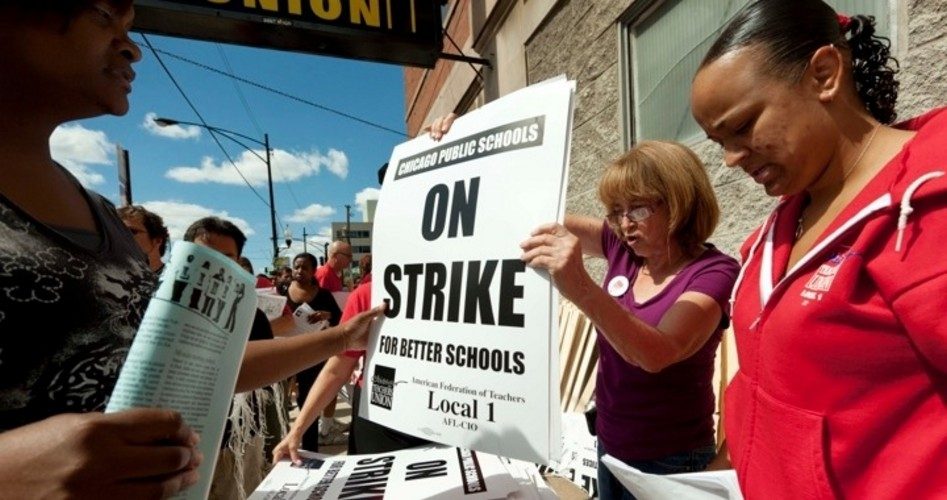
After a debate over new teacher contracts collapsed on September 9, 20,000 public-school teachers in Chicago’s education system went on strike, leaving hundreds of thousands of students without schooling or supervision. Karen Lewis, president of the Chicago Teachers Union, said later that day they had made progress on resolving many provisions in the contract, but “we have failed to reach an agreement that will prevent a labor strike.”
“[W]e are committed to staying at the table until a contract is place,” the union stated in a press release. “However, in the morning no CTU member will be inside our schools. We will walk the picket lines…. We stand in solidarity with our brothers and sisters throughout the state and country who are currently bargaining for their own fair contracts. We stand with those who have already declared they too are prepared to strike, in the best interests of their students.”
The strike has impacted about 350,000 students between kindergarten and high school age, leaving parents to find alternative supervision for their children. Consequently, many parents have sent their children to churches, community centers, and other public facilities. “They’re going to lose learning time,” said Beatriz Fierro, a parent of a child in the district. “And if the whole afternoon they’re going to be free, it’s bad. Of course you’re worried.”
Interesting, though, is the “contingency plan” financed by the school district to open more than 140 schools where students will be fed lunch and breakfast, and receive supervision for the morning and part of the afternoon. The teachers union responded that the plan is a “train wreck,” as the caregivers are not properly trained to supervise children, and they warned of a potential increase in gang-related violence in many high-crime areas in the district.
Educators were disappointed about pay, but said the biggest issues leading to the strike are job security and health benefits, as well as cultivating a better classroom environment. A new evaluation system enacted by the district, which focuses primarily on standardized test scores, could put as many as 6,000 teachers at risk for their jobs, Lewis claimed. In a seemingly dramatic blog post, feminist and honorary chair of the Democratic Socialists of America Gloria Steinem compared the district’s current classroom conditions to “apartheid”:
Tonight, I proudly wear a red t-shirt in support of the Chicago Teachers Union strike. They have been forced to strike — for the first time in 25 years — by the false economy of firing and penalizing the experienced teachers most needed by the students and by new teachers; by lengthening the school day as warehousing without educational services, healthy school buildings, and paid teachers; by what they have the knowledge to call the “apartheid-like system” of differential discipline policies; and by what seems to be a national tactic of demonizing teachers in order to turn public schools into corporate profit centers….
This is why this country needs unions, collective bargaining, and mayors who recognize, honor and fairly pay the people our children know — and who know our children …
“This is unacceptable,” Lewis echoed, referring to the new performance-based evaluations. “This is no way to measure the effectiveness of an educator. Further, there are too many factors beyond our control which impact how well some students perform on standardized tests such as poverty, exposure to violence, homelessness, hunger and other social issues beyond our control.”
Despite already earning an average salary of about $75,000, teachers were not satisfied with a 16-percent increase — doubling an earlier offer — over the next four years, which school officials offered as part of the contract deal. And while a 16-percent increase on salaries averaging $75,000 (before benefits) is not sufficient for the union, the average family in Chicago earns only $47,000 a year.
“Negotiations have been intense but productive, but we have failed to reach an agreement that would prevent a labor strike,” Lewis told reporters September 9.
Chicago Mayor and former White House chief of staff Rahm Emanuel said he was “disappointed” in the union’s decision to carry out the strike, adding that Chicago students are being punished for the union’s unreasonable demands. “I am disappointed that we have come to this point, given that even all the other parties acknowledge how close we are because this is a strike of choice,” Emanuel stated. “Because of how close we are, it is a strike that is unnecessary.”
The school district, like so many other cities across the country, is faced with a looming financial crisis with an estimated budget deficit of $3 billion over the next three years and a mounting sum of pensions committed to new retirees. Chicago teachers pay only three percent of their healthcare costs, while of every new dollar sidelined for public education in the state in the last five years, more than 70 cents has gone to teacher retirement expenses.
After the debate ended last night, Chicago Board of Education President David Vitale said Chicago Public School officials made a reasonable, and their best possible, offer to the group of educators. “There’s only so much money in the system. There’s only so many things that we can do that are available to us,” Vitale affirmed. “At this juncture, it is clearly their decision…. We’ve done everything we can.”
Photo of Chicago Teachers Union members preparing to strike: AP Images

